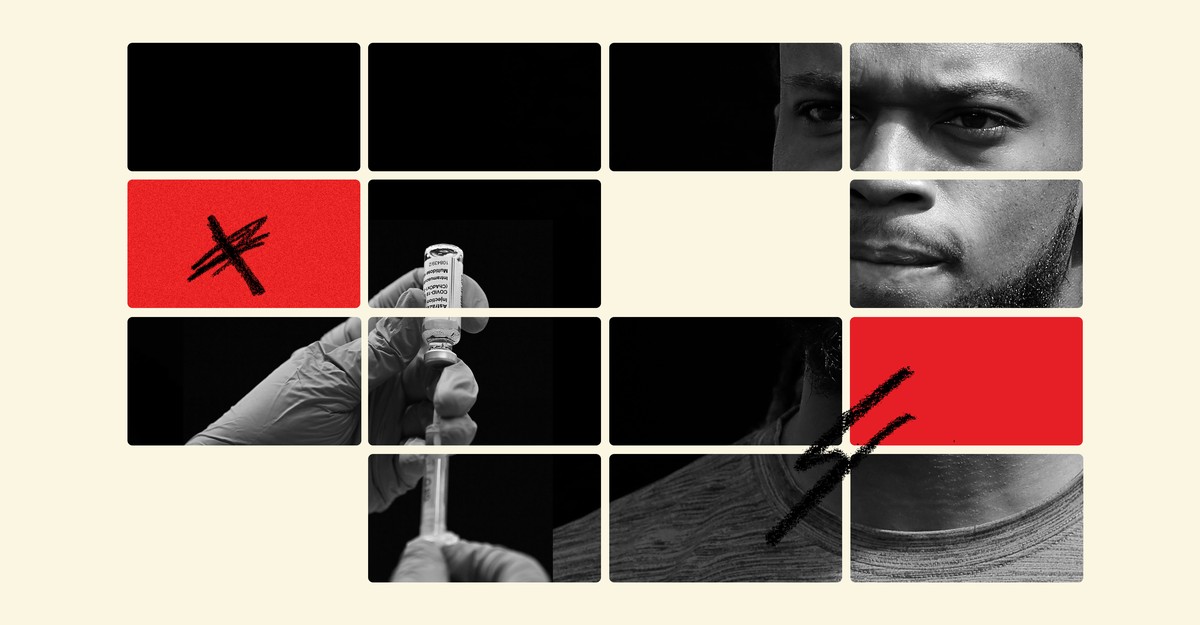Damar Hamlin’s Tragedy, Anti-vaxxers’ Gold

On Monday, the Buffalo Bills player Damar Hamlin collapsed from cardiac arrest during an NFL game. Nearly right away—with little information about Hamlin’s condition publicly available—vaccine-disinformation purveyors hopped onto Twitter to promote the myth that athletes are dying because of the coronavirus shot.
By Tuesday, according to data from the Center for Countering Digital Hate, a nonprofit that studies disinformation and online hate, tweets containing the phrase “died suddenly” (which the group labels an “anti-vaxx trope”) had quadrupled, numbering almost 17,000—four times the daily average of about 4,000.
I spoke over the phone to the CCDH’s CEO, Imran Ahmed, to talk about the entire episode—and how it compares with previous vaccine-disinformation campaigns on Twitter. Ahmed did not hold back when discussing “the sociopathic, predatory nature of these people who prey on tragedy to spread bullshit.” (As of this writing, Hamlin remains in critical condition.)
Our conversation has been condensed and edited for clarity.
Caroline Mimbs Nyce: Can you talk to me a little bit about what you saw after the Hamlin collapse—what the volume of the anti-vax disinformation looked like online?
Imran Ahmed: First of all, it’s worth saying that anti-vaxxers have proven extremely opportunistic—parasites, really, who feed on the algorithmic salience of breaking news and current events to amplify their own narrative.
We have seen consistently that every time a high-profile death has occurred, very quickly, anti-vaxxers have jumped on and said, Yes, that happened because of the vaccine, and here’s the information about it. Right now, they’re trying to promote the anti-vax documentary Died Suddenly.
This is about gaming social-media platforms. They don’t actually care about the narrative content of the idea that a 24-year-old footballer who was vaccinated some time ago suddenly collapsed on the pitch. What they care about is the mathematical amplification that is theirs to enjoy, despite the fact they promote false information all the time, breaking the rules of the platforms. Platforms do not allow the deliberate spread of deadly disinformation. Nevertheless, these people are allowed to continue.
Nyce: Talk to me about how died suddenly became an anti-vaccine trope.
Ahmed: The idea that people are going to die as a result of the vaccine has always been a central charge. Anti-vaxxers only have three charges. One was that COVID’s not that bad. The second is that vaccines are bad. A third is you can’t trust doctors. There were only ever three themes that underpinned all the memes.
This is a classic example of the “vaccines are bad” type. And they’ve been saying for a long time that vaccines are going to kill people. What has proven to continue to be effective messaging is that in that short space between someone dying of unclear causes and the official medical examiner or coroner deciding what was the cause of death, anti-vaxxers will immediately jump in and use that space in which there is uncertainty to say, “The vaccine did it.” Of course, it takes a couple of days for doctors or coroners to work out what exactly happened. This isn’t about other people being bad at getting information out. This is about bad actors weaponizing those moments in which science is doing its job, which is trying to gather evidence. And they are really happy to weaponize the deliberate pace of science in order to sow disinformation.
Nyce: And how do we combat that kind of disinformation?
Ahmed: Really simply: Don’t give them the world’s most powerful communications platform to spread this stuff. There is no way to combat it. This is an asymmetric battle, because disinformation is designed to be non-falsifiable. So how do you falsify in the absence of actual medical information in that period? How do you falsify that they died of a vaccine? Of course it’s implausible. You’re not going to spend every moment of your day trying to debunk the overwhelming tidal wave of bullshit that comes from anti-vaxxers.
It’s an asymmetric battle, because they can flood the zone with lies faster than we could possibly debunk them. So this is not a debunking job. This is a [question of] why are people who systematically break the rules of platforms allowed to continue to do so? And the reason why is because it draws attention. And for social-media platforms, they are in an unholy battle right now to hold on to the ill-gotten revenue generated by the attention given to deliberate disinformation.
Nyce: Obviously, right now Elon Musk’s takeover of Twitter, and the policy changes he has made to moderation, is a hot topic. Did anything about the way that this unfolded on Twitter surprise you? Do you think it would have been different had Elon not been in charge?
Ahmed: No, it wouldn’t have been different. This is not an Elon Musk question. Twitter has always been atrocious at dealing with anti-vax disinformation. And it took a long time for them to act, for example, on the Disinformation Dozen that CCDH wrote about in early 2021. Twitter is an incredibly badly run company, and it has been for a long time. It has never had sufficient moderation staff to be able to deal with things.
What Twitter’s playbook used to be was to tell everyone that they’re trying their best. Elon, in one respect, is much more honest about it. He’s doing nothing, and he’s saying, Yeah, I’m doing nothing, mate.
Nyce: With this particular incident, how much were the usual suspects involved? You mentioned the Dozen that you all had reported on in 2021.
Ahmed: These are all familiar bullshit artists. One of them is the Twitter account for the movie Died Suddenly.
Nyce: I’m not sure how many people know this: Died Suddenly is a viral documentary. And that phrase and that hashtag are considered anti-vax and have become a meme in that community?
Ahmed: It’s the hashtag chosen by the producers of this movie, which alleges that people who die suddenly are dying because of the vaccine.
My wife and I are hoping to have children in the next couple of years. And when you become a parent, you start to think about, What if we bring this thing into the world that is wonderful, and it dies in the first year of Sudden Infant Death Syndrome? And it’s like someone coming along and preying on that anxiety, and telling you, “No, no, that’s because of the vaccine, these sudden deaths. The doctors have been lying to you—they’re in a big cabal. They’re killing your child.”
It is the sociopathic, predatory nature of these people who prey on tragedy to spread bullshit, and it is so depressing that anyone would help them—let alone some of the biggest companies in the world, which are not just facilitating but helping to monetize and often knowingly enabling this kind of parasitic behavior.
Nyce: You all reported that the number of “died suddenly” tweets quadrupled after the incident on Monday night. How does that compare to other similar disinformation campaigns around prominent people either having cardiac episodes or dying?
Ahmed: The baseline was different when the pandemic was active, because there was a high baseline. So this is a sudden resurgence of activity. We haven’t seen this kind of resurgence recently. Their messages are taking advantage of the weakened immune system in social media and in particular on Twitter. Because Twitter really has no immune system and is completely immunocompromised. It’s now ridden with disinformation actors pushing disinformation narratives, making it an incredibly uncertain environment to get information from. Because you don’t know who’s posting what and for what reason.
And the truth is that because of the way the algorithms work, at a really simple level, disinformation has the advantage on social-media platforms, because it receives engagement from people who support it and people who oppose it and people who are fact-checking it. And the problem is that these narratives then start to build trends of their own.
Nyce: A lot of people were really surprised by how quickly the anti-vax stuff started cropping up after Hamlin’s collapse on Monday night. Were you surprised by the timeline at all?
Ahmed: No, no. They’re really fast, because, look, they don’t have to worry about coming up with facts. They just have to come up with a lie. You can be the best cardiac surgeon in the world. You could be watching, and you would have no idea what happened. But for someone selling lies—I could make up something. “It was an invisible horse. It trampled him. Didn’t you see it? It was an invisible horse. I’m sure. I could hear it. I couldn’t see it, obviously, because it’s invisible, but I could hear it. Go back and listen to it really carefully. The crowd is very loud, but there’s definitely an invisible horse.” I mean, this sort of junk is very easy to make up.
And by the way, saying he died because of a vaccine is as ludicrous as saying he died because of an invisible horse. It is profoundly ludicrous to me, because more than two-thirds of the world’s population has taken the vaccine—billions of people.
This article has been archived for your research. The original version from The Atlantic can be found here.


